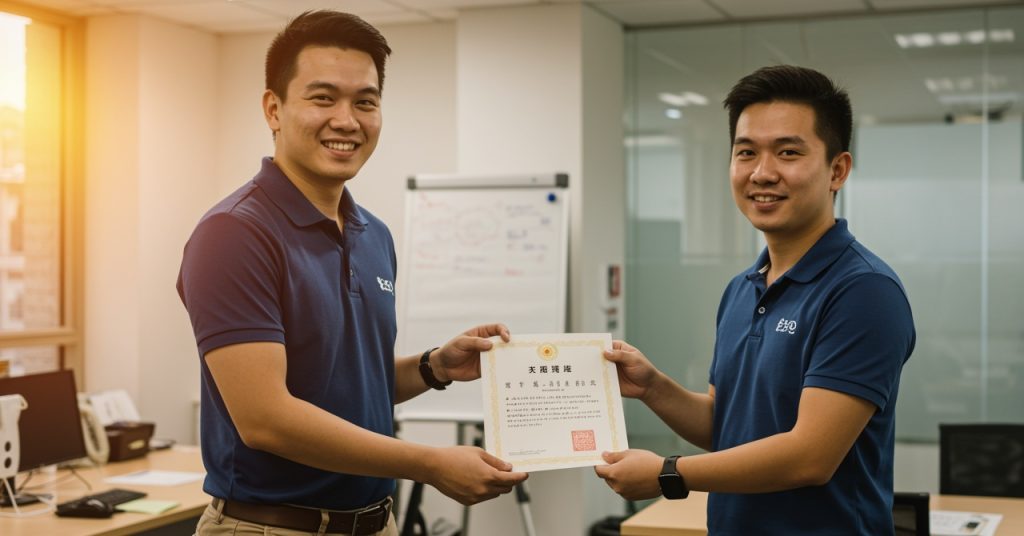When you’re applying for jobs in Taiwan, your experience matters—but having certified skills can make all the difference. I didn’t realize how powerful a simple document could be until I saw how fast others were getting hired, simply because they had something I didn’t: a recognized certificate proving their expertise.
If you’re serious about standing out, earning a skills certificate recognized by Taiwan’s Ministry of Labor gives you that edge. It signals to employers that you’re trained, tested, and ready to work under their standards.

What is Taiwan’s Skills Certification System?
Taiwan’s Skills Certification System is run by the Ministry of Labor (MOL) through the Workforce Development Agency (WDA). It ensures that workers—whether local or foreign—meet the technical and safety standards needed in their field.
Here’s why it matters:
- More Job Opportunities – Employers prefer candidates with verifiable skills.
- Better Salary Potential – Certified workers often command higher pay.
- Faster Hiring – Some certifications offer same-day testing and results.
- Credibility Across Industries – Your certificate is recognized nationwide.
- Career Growth – It opens the door to more specialized or supervisory roles.
There are three main types of certifications:
- National Technicians’ Skills Examinations
- Open to the public and conducted regularly each year.
- Best for industries like electronics, manufacturing, food processing, construction, and automotive work.
- Requires passing written and practical exams.
- Same-Day Certification Examinations
- Ideal for urgent job applications.
- Candidates are tested, graded, and certified within a single day.
- Best for trades that need fast validation like food safety, welding, or caregiving.
- Project Technicians’ Skills Examinations
- For specific groups such as:
- Students
- Public institution trainees
- Military personnel
- Government workers
- For specific groups such as:
These certifications don’t just look good on paper. They’re legally backed, professionally valued, and often required for promotion or long-term employment.
How to Get a Skills Certificate Recognized by Taiwan Employers
Here’s the step-by-step process:
- Choose the Right Certificate
Visit Taiwan’s WDA portal or ask your employer which certification matches your job. Popular fields include:
- Electronics & machinery
- Caregiving & health services
- Welding, plumbing, construction
- Culinary & food preparation
- Check the Eligibility Requirements
Each test has its own qualifications. You may need:
- Proof of work experience
- Formal training or vocational education
- ARC (Alien Resident Certificate)
- Register for the Examination
Sign up through authorized testing centers. Many cities in Taiwan have MOL-accredited venues.
- Prepare for the Exam
Use study guides provided by the WDA, join review classes, or practice through online resources. Some employers even provide prep sessions.
- Take the Test
Most exams include both written and hands-on practical components. Choose a schedule that works for you and bring the necessary ID and documents.
- Get Certified
If you pass, you’ll receive an official skills certificate endorsed by the Ministry of Labor—recognized by employers across Taiwan.
What Skills Certifications Are Most Useful for OFWs?
Not all certifications are equally valuable depending on your field. Here’s a quick guide:
| Certification Type | Best For | Benefits |
| National Technicians’ Skills Exam | Manufacturing, technical roles | Higher pay, long-term contracts |
| Same-Day Certification | Food industry, caregiving | Quick hiring, fast documentation |
| Project Technicians’ Exam | Public employees, military, students | Government-linked career growth |
Other Useful Training for OFWs in Taiwan
If you’re just starting out or want to add to your skillset, consider OWWA’s training programs. Over 300 OFWs in Taiwan recently completed these and received certificates for:
- Basic Mandarin – For better communication with employers
- Haircutting, Massage, and Makeup – Practical skills for side income
- Computer Courses – For office-based or freelance work
- Baking & Barista – Entry into the growing food industry
These certificates, while not part of Taiwan’s MOL system, still boost your job readiness and can open new doors.
You can read more about how these skills can fuel your professional development here: Career Growth Opportunities for Filipinos in Taiwan
There are other free initiatives from Taiwan’s Ministry of Labor such as this one, even offering some prizes to boot:
Final Tips Before You Apply
- Ask your employer if a certification is required or if they recommend one.
- Start small if you’re unsure—basic certifications can still make a big impact.
- Keep a copy of all your certificates (physical and digital) for job applications.
- Network with other OFWs who’ve already taken the test—they can share tips and review resources.
Frequently Asked Questions
Q: Can I take the exam even if I’m not fluent in Mandarin?
A: Some exams may offer English versions or translation assistance. It’s best to ask the test center in advance.
Q: Are OWWA training certificates accepted by Taiwanese employers?
A: While they’re not part of the MOL certification system, OWWA certificates still boost your profile and may help in related industries.
Q: How long is a MOL skills certificate valid?
A: Most certifications are valid indefinitely but may need renewal in regulated industries like health or safety services.
Conclusion
Getting a skills certificate for OFW jobs in Taiwan is more than just a formality. It’s a signal—to employers, coworkers, and yourself—that you’re committed to excellence. Whether you’re applying for your first role or looking to level up, certification shows you mean business.
And in a competitive market, that can be the one thing that sets you apart.
